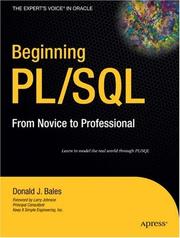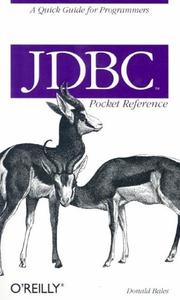| Listing 1 - 6 of 6 |
Sort by
|

ISBN: 1281087319 9786611087319 1430204206 1590598822 Year: 2007 Publisher: Berkeley, CA : New York : Apress ; Distributed to the book trade by Springer-Verlag,
Abstract | Keywords | Export | Availability | Bookmark
 Loading...
Loading...Choose an application
- Reference Manager
- EndNote
- RefWorks (Direct export to RefWorks)
Get started with PL/SQL, the built-in language that every Oracle developer and database administrator must know, in Beginning PL/SQL, a fast-paced and example-filled tutorial. Learn from author Don Bales extensive experience to discover the most commonly used aspects of PL/SQL, without wasting time with obscure and obsolete features. Bales takes his 20+ years of experience and a wealth of statistics he's gathered on PL/SQL usage over those years and applies the 80/20 rule: cover what's most needed and used by PL/SQL professionals and avoid what's not necessary! The result is a book that covers all the key features of PL/SQL without wasting your time discussing esoteric and obsolete parts of the language. Learn what really matters, so that you can get to work feeling confident with what you know about PL/SQL. Discover the 20% of PL/SQL that gives you 80% of the bang! Key topics covered include variables and datatypes, executing statements, working with cursors, real-world objects, debugging, testing, and more. Learn how to write production-level, object-oriented PL/SQL. You'll explore relational PL/SQL, but unlike most other books on the subject, this one emphasizes the use of PL/SQLs object-oriented features as well. Work through real examples of using of PL/SQL. You'll learn PL/SQL by applying it to real-world business problems, not by heavy theory.
PL/SQL (Computer program language) --- Relational databases. --- Oracle (Computer file) --- Relational data bases --- Databases --- Procedural Language/SQL --- Query languages (Computer science) --- Oracle7.3 --- Oracle 7.3 --- Personal Oracle7 --- Personal Oracle 7 --- Information Technology --- General and Others --- Database management. --- Software engineering. --- Database Management. --- Software Engineering/Programming and Operating Systems. --- Computer software engineering --- Engineering --- Data base management --- Data services (Database management) --- Database management services --- DBMS (Computer science) --- Generalized data management systems --- Services, Database management --- Systems, Database management --- Systems, Generalized database management --- Electronic data processing --- Oracle (Computer software)
Book
ISBN: 9781484207376 1484207386 9781484207383 1484207378 Year: 2015 Publisher: Berkeley, CA : Apress : Imprint: Apress,
Abstract | Keywords | Export | Availability | Bookmark
 Loading...
Loading...Choose an application
- Reference Manager
- EndNote
- RefWorks (Direct export to RefWorks)
Beginning Oracle PL/SQL gets you started in using the built-in language that every Oracle developer and database administrator must know. Oracle Database is chock-full of built-in application features that are free for the using, and PL/SQL is your ticket to learning about and using those features from your own code. With it, you can centralize business logic in the database, you can offload application logic, and you can automate database- and application-administration tasks. Author Don Bales provides in Beginning Oracle PL/SQL a fast-paced and example-filled tutorial. Learn from Don’s extensive experience to discover the most commonly used aspects of PL/SQL, without wasting time on obscure and obsolete features. The author takes his 20+ years of experience and a wealth of statistics he's gathered on PL/SQL usage over those years and applies the 80/20 rule: cover what's most needed and used by PL/SQL professionals and avoid what's not necessary! The result is a book that covers all the key features of PL/SQL without wasting your time discussing esoteric and obsolete parts of the language. Learn what really matters, so that you can get to work feeling confident with what you know about PL/SQL. Covers the key topics that matter, including variables and datatypes, executing statements, working with cursors, bulk operations, real-world objects, debugging, testing, and more. Teaches you to write production-level, object-oriented PL/SQL. You'll explore relational PL/SQL, but unlike most other books on the subject, this one emphasizes the use of PL/SQLs object-oriented features as well. Guides you in working through real examples of using of PL/SQL. You'll learn PL/SQL by applying it to real-world business problems, not by heavy theory.
Computer Science. --- Database Management. --- Computer science. --- Database management. --- Informatique --- Bases de données --- Gestion --- PL/SQL (Computer program language) --- Query languages (Computer science) --- Database management --- Engineering & Applied Sciences --- Computer Science --- Oracle (Computer file) --- Procedural Language/SQL --- Oracle7.3 --- Oracle 7.3 --- Personal Oracle7 --- Personal Oracle 7 --- Data base management --- Data services (Database management) --- Database management services --- DBMS (Computer science) --- Generalized data management systems --- Services, Database management --- Systems, Database management --- Systems, Generalized database management --- Electronic data processing --- Informatics --- Science

ISBN: 0596004575 Year: 2003 Publisher: Sebastopol O'Reilly
Abstract | Keywords | Export | Availability | Bookmark
 Loading...
Loading...Choose an application
- Reference Manager
- EndNote
- RefWorks (Direct export to RefWorks)
Samenvatting:The JDBC Pocket Reference offers quick look-ups for all methods of thestandard JDBC classes. These include concise reviews of the proceduresfor common JDBC tasks such as connecting to a database, executing storedprocedures, executing DDL and the like. You'll find documentation of theconnect string formats for the most common databases, including Oracle,SQL-Server, and PostgreSQL. You'll even find information on working withlarge objects, and on using SQL99 user defined datatypes to work withobject-relational data. Searching for this sort of material through largetutorials is frustrating and a waste of time, but this pocket-sized bookis easy to take anywhere and makes finding the information you need asnap
Gegevensbanken --- Java (programmeertaal) --- Programmeren --- AA / International- internationaal --- 654 --- JDBC --- Java --- Programmeertalen: Java --- Informatieverwerking. Bureautica. --- Gegevensbanken. --- Java (programmeertaal). --- Programmeren. --- Application program interfaces (Computer software) --- Database management --- Java (Computer program language) --- Object-oriented programming languages --- JavaSpaces technology --- APIs (Computer software) --- Interfaces, Application program (Computer software) --- Application software --- Computer programs --- Informatieverwerking. Bureautica
Digital
ISBN: 9781484207376 9781484207383 9781484207390 Year: 2015 Publisher: Berkeley, CA Apress
Abstract | Keywords | Export | Availability | Bookmark
 Loading...
Loading...Choose an application
- Reference Manager
- EndNote
- RefWorks (Direct export to RefWorks)
Beginning Oracle PL/SQL gets you started in using the built-in language that every Oracle developer and database administrator must know. Oracle Database is chock-full of built-in application features that are free for the using, and PL/SQL is your ticket to learning about and using those features from your own code. With it, you can centralize business logic in the database, you can offload application logic, and you can automate database- and application-administration tasks. Author Don Bales provides in Beginning Oracle PL/SQL a fast-paced and example-filled tutorial. Learn from Don’s extensive experience to discover the most commonly used aspects of PL/SQL, without wasting time on obscure and obsolete features. The author takes his 20+ years of experience and a wealth of statistics he's gathered on PL/SQL usage over those years and applies the 80/20 rule: cover what's most needed and used by PL/SQL professionals and avoid what's not necessary! The result is a book that covers all the key features of PL/SQL without wasting your time discussing esoteric and obsolete parts of the language. Learn what really matters, so that you can get to work feeling confident with what you know about PL/SQL. Covers the key topics that matter, including variables and datatypes, executing statements, working with cursors, bulk operations, real-world objects, debugging, testing, and more. Teaches you to write production-level, object-oriented PL/SQL. You'll explore relational PL/SQL, but unlike most other books on the subject, this one emphasizes the use of PL/SQLs object-oriented features as well. Guides you in working through real examples of using of PL/SQL. You'll learn PL/SQL by applying it to real-world business problems, not by heavy theory.
Digital
ISBN: 9781430204206 Year: 2007 Publisher: Berkeley, CA Apress, Inc
Abstract | Keywords | Export | Availability | Bookmark
 Loading...
Loading...Choose an application
- Reference Manager
- EndNote
- RefWorks (Direct export to RefWorks)
Programming --- programmeertalen --- SQL (structured query language) --- Oracle
Book
ISBN: 9781430204206 Year: 2007 Publisher: Berkeley, CA Apress, Inc.
Abstract | Keywords | Export | Availability | Bookmark
 Loading...
Loading...Choose an application
- Reference Manager
- EndNote
- RefWorks (Direct export to RefWorks)
Get started with PL/SQL, the built-in language that every Oracle developer and database administrator must know, in Beginning PL/SQL, a fast-paced and example-filled tutorial. Learn from author Don Bales extensive experience to discover the most commonly used aspects of PL/SQL, without wasting time with obscure and obsolete features. Bales takes his 20+ years of experience and a wealth of statistics he's gathered on PL/SQL usage over those years and applies the 80/20 rule: cover what's most needed and used by PL/SQL professionals and avoid what's not necessary! The result is a book that covers all the key features of PL/SQL without wasting your time discussing esoteric and obsolete parts of the language. Learn what really matters, so that you can get to work feeling confident with what you know about PL/SQL. Discover the 20% of PL/SQL that gives you 80% of the bang! Key topics covered include variables and datatypes, executing statements, working with cursors, real-world objects, debugging, testing, and more. Learn how to write production-level, object-oriented PL/SQL. You'll explore relational PL/SQL, but unlike most other books on the subject, this one emphasizes the use of PL/SQLs object-oriented features as well. Work through real examples of using of PL/SQL. You'll learn PL/SQL by applying it to real-world business problems, not by heavy theory.
Programming --- programmeertalen --- SQL (structured query language) --- Oracle
| Listing 1 - 6 of 6 |
Sort by
|

 Search
Search Feedback
Feedback About UniCat
About UniCat  Help
Help News
News